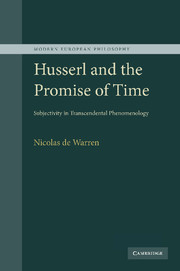Book contents
- Frontmatter
- Contents
- Acknowledgments
- List of abbreviations
- Introduction: the promise of time: subjectivity in Husserl's transcendental phenomenology
- 1 The ritual of clarification
- 2 A rehearsal of difficulties
- 3 The ghosts of Brentano
- 4 The retention of time past
- 5 The impossible puzzle
- 6 The lives of Others
- 7 The life of consciousness
- Appendix: note on textual sources
- Bibliography
- Index
1 - The ritual of clarification
Published online by Cambridge University Press: 20 January 2010
- Frontmatter
- Contents
- Acknowledgments
- List of abbreviations
- Introduction: the promise of time: subjectivity in Husserl's transcendental phenomenology
- 1 The ritual of clarification
- 2 A rehearsal of difficulties
- 3 The ghosts of Brentano
- 4 The retention of time past
- 5 The impossible puzzle
- 6 The lives of Others
- 7 The life of consciousness
- Appendix: note on textual sources
- Bibliography
- Index
Summary
Under what obligation do I lie of making such an abuse of time?
— David HumeAn untimely provocation
Husserl was a philosopher who believed that the course of Western history could never forsake the idea of philosophy first ushered into the world with Greek thinking, even as he recognized that he came to philosophy in an historical epoch in which that unique window of human possibility was rapidly, and perhaps entirely, coming to a close. From the seminal Logical Investigations to the unprecedented Crisis of the European Sciences, Husserlian phenomenology struggled to define itself against the current of an age that unthinkingly abdicated a responsibility towards the highest perfection of reason in the name of a reason paradoxically called modern. Husserlian phenomenology is therefore best approached as an untimely provocation, the thrust of which is encapsulated in the charge that “the spirit of radicalism has been lost under the title of philosophy” (Hua VIII, 10). This call to radicalism takes on different forms. Its most visible banner is the motto “back to the things themselves” that commonly informs our view of Husserl's enterprise, to the extent that the generalized term “phenomenology” is often taken as synonymous with any invocation of lived experience and the “first person point of view” in contemporary philosophical discourse. The primary concern, however, that animates Husserlian phenomenology is neither “lived experience” nor “consciousness” as such, but a problem first broached in the Logical Investigations that continually defined, with increased sophistication and breadth, the center of Husserl's gravity, and to which he untiringly returned once again in the unfinished Crisis of the European Sciences: how is knowledge possible?
- Type
- Chapter
- Information
- Husserl and the Promise of TimeSubjectivity in Transcendental Phenomenology, pp. 10 - 49Publisher: Cambridge University PressPrint publication year: 2009



